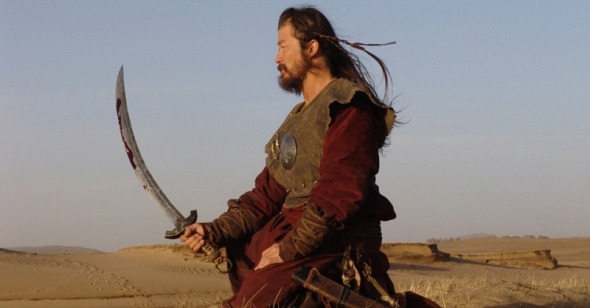Fascist Faux Pas
by Michael Joshua Rowin
Mongol
Dir. Sergei Bodrov, Russia/Germany/Kazakhstan/Mongolia, Picturehouse
Mongol marks a personal first for this reviewer: a bloated epic so boring and unengaging that by its numbing conclusion (the word anticlimactic can only be used for stories that actually build) he was zapped even of the conviction to hate it. An international co-production that probably broke the bank of several film companies from Russia, Germany, Mongolia, and Kazakhstan, and 2008’s official Academy Awards foreign film entry for the latter country, Mongol is one of those violent, historical blockbusters that have been multiplying like swamp rats (Gladiator, Apocalypto, 300) ever since the head-slapping enshrinement of Braveheart by the Academy back in 1995. The ensuing years have seen the action scenes get sloppier, the connections to actual history looser, and the clichés thicker to the point where a fourth-rate derivative like “Mongol” can’t even compete on the basic level of spectacle with its forebears. For a film riding on adrenaline it’s an amazingly dispiriting affair, so inept in humanizing its legendary protagonist, Genghis Khan, and uninspired in its portrayal of marauding chaos that it fails to provide the simple sugar rush of the most competently empty-headed of adventures -- “Mongol” is instead the crash that comes after.
So, yeah, Mongol depicts the beginnings of that ferocious Mongolian ruler who conquered half the world, Genghis Khan, here known by his birth name, Temudjin (Tadanobu Asano). According to the film, Genghis’s rise to power was conveniently cut from the same old “Hero With a Thousand Faces” cloth whereby a mythological Chosen One suffers estrangement from his family (tribe leader father is poisoned by rivals as heir Temudjin is cast out by an usurper), overcomes adversity (frequent imprisonments by enemies, including his former friend, Jamukha, and the abduction of his bride, Borte), and, because he was forged in the fire of the gods (the thunder that all other Mongols inherently fear), emerges as the unifier and leader of men. The real story of Khan may very well be unique, but as cowritten (with Arif Aliyev) and directed by Sergei Bodrov it’s a litany of lazy, Hollywood-influenced bromides (two personal favorites: the hut that goes up in flames in less than a second and the villain who directly states the reason for his villainy), amping up epicness at the expense of any insight into the historical time period or the political and ethnic conflicts that defined it; William Wallace, Maximus, or Jaguar Paw would be equally at home in the film’s late twelfth, early thirteenth-century world. As for giving the people what they paid for, Mongol’s hyper-stylized violence is by now so predictable you can almost rest your eyes during each right-on-time slo-mo sword slashing. A few rolling, postcard-ready landscapes cleanse the visual palette for an establishing shot or two, but they’re cancelled out by the more frequent ugly digital smears representing gigantic armies.
In any case, it’s doubtful that a Genghis Khan biopic is a worthwhile endeavor—despite his legacy as conqueror and founder of an enormous empire, by most accounts the man’s reign was marked by merciless brutality. Mongol, however, would have you think that he was merely a family man dedicated to his One True Love (Borte’s role in the film is to dutifully rescue or be rescued) and defeating the antagonists opposed to his warrior’s ethics of integrity and honor. It’s at best an awkward case to make, but, sadly, since this film is mainly meant for a crossover Western audience, the echoes of Khan’s destruction reside so far in the past and across the ocean that the filmmakers might just get away with it. In case they do, imagine how a hagiography of the ascent of Stalin would go over. Pretty offensive, no?
